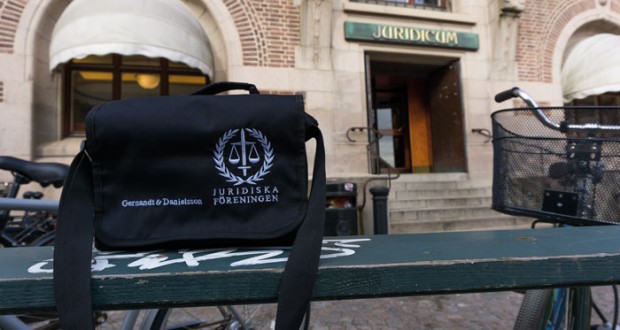Despite extensive sponsoring, Lund University currently lacks a sponsoring policy. Instead it is up to the employees to decide what kind of sponsoring is reasonable – and whom it can accepted from.
During the second semester of the law program, the course General property law is given. The course is appreciated by many students since it comprehensively ties working life with three external lecturers: one prosecutor and two lawyers.
“We think it is great to bring in professionals who can talk about how things are in the working life”, says course coordinator Eva Lindell-Frantz.
Advertising during the seminar
But, unlike many other external lecturers who teach at the university, the two lawyers from Mannheimer Swartling do not cost anything for the University. Instead, the company logo is printed on the preparative question printouts given to the students before the practice seminars, which furthermore start with an introduction of the company’s business. This has made many students react, and question the independence of the program.
“I know that the course representatives have mentioned this, but I do not think it is a big concern, since the students come in contact with many different representatives from different firms and agencies”, says Eva Lindell-Frantz
But there are students who disagree.
“The advertisements we are exposed to as students are very obvious, and if anyone asked me to name five law firms I know exactly which ones I would instantly think of. The coffee at the union is courtesy of them, as well as the school assignments. I think it is problematic”, says an anonymous law student.
Unclear rules
In Sweden, we do not have any particular regulations concerning companies sponsoring authorities. However, many universities today have a sponsoring policy that clarifies what type of sponsoring the university should accept, and what types to avoid. But at Lund University, every employee gets to decide what to do, and people see no need for a general policy. Instead, the University refers to the guidelines of The Swedish National Financial Management Authority, the ESV. The ESV on the other hand, are clear in their guidelines when it comes to recommending that an authority who accepts sponsors should have its own guidelines.
“This is relevant not least when it comes to a larger authority, which Lund University is. It sounds weird that everyone can do as they please. It would be befitting to have the same policy within the authority”, says Lasse Henricsson, financial expert at the ESV.
Policy of their own
Many of the other universities with a policy are careful with sponsoring not being used to cover for basic cost of an activity, such as salaries and regular educational activities. According to the ESV, the reason why there should be a sponsoring policy is because sponsoring can pose other risks for the authority. Among other things, the general publics’ trust in the authority’s independence, objectivity and impartiality can be undermined.
“That sounds reasonable. This is something we will have to take action on and think about how we could work with in a better way”, says planning director Tim Ekberg, who represents Lund University in this issue. Sponsoring of Lund University however, is not only done through free lectures. According to the economy department, the University accepted approximately one million SEK in sponsorship in 2015.
Facts:
Sponsoring is, according to The Swedish National Financial Management Authority: “A mutual agreement where one party leaves the other party a remuneration (cash funds, goods or favors) and the other party gives a quid pro quo which at least partially is made up of exposure of a company or brand name”.
Translation: Elise Petersson






